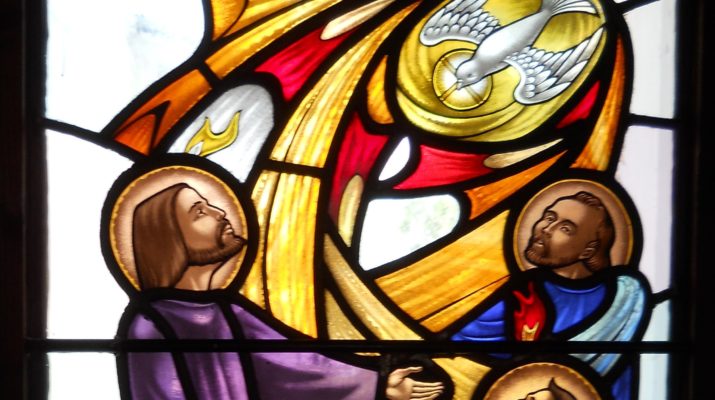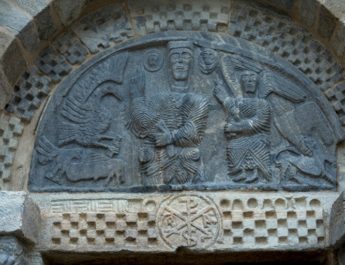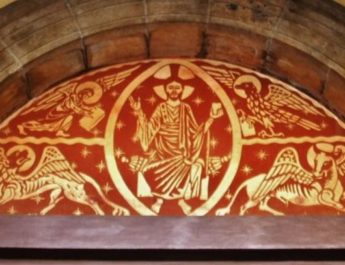John 14:25-27
Narrative Lectionary
25 “I have said these things to you while I am stillA with you. 26 But the Advocate,B the HolyC Spirit,D
A “am still” = meno. This is to stay, remain, wait, await, continue, abide, endure. It can mean to literally stay in a place or to remain in a condition or to continue with hope and expectation.
B “Advocate” = Parakletos. 5x in NT. From parakaleo (to call to, summon, invite, request, or beg; to exhort or admonish; to encourage, comfort, or console; has legal overtones and is used of one’s advocate in a courtroom); {from para (beside, by, in the presence of) + kaleo (to call by name, invite, to name, bid, summon, call aloud); {related to keleuo (to command, order, direct); from kelomai (to urge on)}}. This is someone who is called for aid or assistance. Properly, it refers to a a legal advocate who is close to the situation and speaks in court. This is advocate, helper, comforter, helper, or intercessor. It is also used as a technical term for the Holy Spirit – the Paraclete.
C “Holy” = Hagios. From hagnos (holy, sacred, pure ethically, ritually, or ceremonially; prepared for worship, chaste, unadulterated, pure to the core; undefiled by sin; figurative for innocent, modest, perfect). God is totally different from humanity and thus set apart. That which is consecrated to worship God (elements of worship) or to serve God (as the saints) are holy because they are now set apart for God’s purposes. Holy because important to God. This is sacred physically, pure. It can be morally blameless or ceremonially consecrated.
D “Spirit” = Pneuma. From pneo (to blow, breath, breathe hard). This is wind, breath, or ghost. A breeze or a blast or air, a breath. Figuratively used for a spirit, the human soul or part of us that is rational. It is also used supernaturally for angels, demons, God, and the Holy Spirit. This is where pneumonia comes from.
whom the FatherE will sendF in my name,G will teachH you everything, and remindI you of all that I have said to you.
E “Father” = Pater. This is father in a literal or figurative sense. Could be elder, senior, ancestor, originator, or patriarch.
F “send” = pempo. This is to send, put forth, or dispatch. This often refers to a temporary errand. It is sending someone with a focus on the place they departed from. By contrast, another Greek word, hiemi, emphasizes the destination and yet another word, stello, focuses on the motion that goes with the sending.
G “name” = onoma. May be from ginosko (know, recognize, learn from firsthand experience). This is a name, authority, cause, character, fame, reputation. The name was thought to include something of the essence of the person so it was not thought to be separate from the person.
H “teach” = didasko. From dao (learn). This is to teach, direct, instruct, or impart knowledge. In the New Testament, this is almost always used for teaching scripture.
I “remind” = hupomimnesko. Related to “am still” in v25. 7x in NT. From hupo (by, under, about, subordinate to) + mimnesko (to remind or remember; memory through an active, intentional process or being mindful; not incidentally or accidentally remembering); {from mnaomai (to remember; by implication give reward or consequence); perhaps from meno (see note A above)}. This is to remind or remember, to call attention to.
27 PeaceJ I leaveK with you; my peace I give to you. I do not give to you as the worldL gives.
J “peace” = eirene. Perhaps from eiro (to join, tie together to form a whole). This is one, peace, quietness, rest, peace of mind, harmony. Peace was a common farewell among Jews (i.e. shalom) and this well-wishing included a blessing of health and wholeness for the individual. This word also indicates wholeness and well-being – when everything that is essential is joined together properly. This is peace literally or figuratively. By implication, it is prosperity (but not in the sense of excessive wealth. Prosperity would have meant having enough from day to day.)
K “leave” = aphiemi. From apo (from, away from) + hiemi (to send). This is send away, release, permit, forgive, allow to depart, discharge, or send forth.
L “world” = kosmos. Perhaps from the base of komizo (to carry, convey, recover); from komeo (to take care of). This is order, the world, the universe, including its inhabitants. Literally, this is something that is ordered so it can refer to all creation. It can also refer to decoration in the sense that something is better ordered and, thus, made more beautiful. This is where “cosmos” and “cosmetics” come from.
Do not let your heartsM be troubled,N and do not let them be afraid.O
M “hearts” = kardia. Literally the heart, but figuratively mind, character, inner self, will, intention, thoughts, feelings. Also, the center of something. The word heart is only used figuratively in the Old and New Testaments. This is where “cardiac” comes from. Here, singular.
N “be troubled” = tarasso. 18x in NT. This is trouble, agitate, stir up. It is motion back and forth, creating inner turmoil or confusion, roiling water.
O “be afraid” = deiliao. 1x in NT. From deilia (cowardice, reticence); from deilos (fearful, timid, faithless, fear of losing); {from deos (fear, reverence) or deido (to fear)}. This is to live in fear, be timid. It is living with an intense fear of consequences.
Image credit: “Holy Spirit Descending upon Jesus” at All Saints Episcopal Church, Jensen Beach, Florida.




